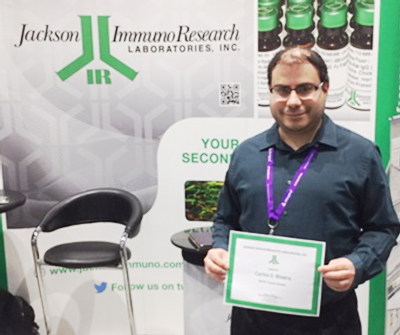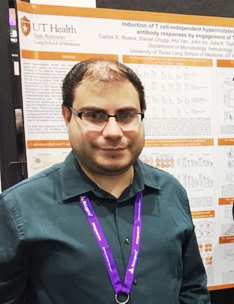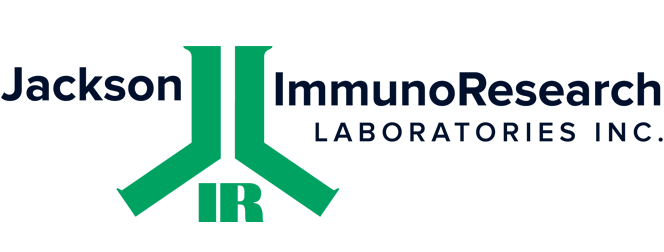
Congratulations to the recipient of Jackson ImmunoResearch’s $1,000 travel grant for AAI 2019!
Jackson ImmunoResearch continues to offer travel funding to support researchers attending academic meetings and conferences.
JIR invited applications from attendees of the American Association of Immunology 2019 conference in San Diego, California to receive a travel award of $1,000 to be used against costs incurred attending the meeting.
The event was AAI’s 103rd annual meeting. Running for over 100 years, AAI is an important world forum for researchers dedicated to advancing the field of immunology through investigation of the basic principles of immune function. The conference aims to support the interchange of ideas and information between investigators, and usher the translation of this information into clinical practice.
Find more information about the American Association of Immunology conference here.
Travel award winner AAI 2019
The recipient of JIR’s AAI 2019 travel grant is Carlos Rivera, who is a Doctoral Candidate at the Department of Microbiology, Immunology & Molecular Genetics, Long School of Medicine, University of Texas Health Science Center San Antonio

Read about his research and experience of presenting a talk at AAI for the first time.
Research Summary
“My line of research focuses on T cell-independent antibody responses, particularly those that can confer protection to infectious challenges. The significance of this project is that deficiencies in T cells, which provide important help to B lymphocytes toward the generation of an effective antibody response, account for a significant proportion of primary immunodeficiencies in patients, age-related immune defects, and acquired immunodeficiency in viral infections. Therefore, it is important to explain the mechanisms and potential of vaccine strategies that allow for effective antibody responses independently of T cells.
Our lab has shown that co-engagement of a B cell receptor (BCR) and a Toll-like receptor (TLR) on B cells induces immunoglobulin class switch DNA recombination (CSR) and plasma cell differentiation in vitro. Prompted by these findings, we used NP hapten conjugated to lipopolysaccharides (NP-LPS) as well as flagellin, a TLR5 ligand that can also function as an antigen, in mice devoid of T cells to show that a single stimulus that can affect co-engagement of a BCR and a TLR can trigger B cell differentiation and production of class-switched and high-affinity antigen-specific antibodies in vivo. Furthermore, we have recently shown that such antibodies endow these mice the ability to clear Salmonella infection in vivo and display complement-mediated bactericidal activity in vitro.
Thus, co-engagement of TLR4-BCR or TLR5-BCR can induce a mature and protective T cell-independent antibody response. I am very excited about this work as this strategy could provide the basis for new TLR-based B cell-targeted vaccine strategies.”
Attending AAI 2019
“This year’s AAI meeting in San Diego marked my third opportunity to give a poster presentation on my research work and my first opportunity to deliver an oral presentation at the national stage, an experience that will certainly be one to remember.
I was quite nervous at first, but the audience was very understanding, so I managed to pull myself together, get over my nerves, and deliver a presentation that was well received at the end. In return, I received a lot of positive feedback and constructive criticism, equally, from both peers and leaders in the field, which gave me the opportunity to discuss science and exchange ideas with more individuals as compared to previous years at AAI. This opened potential new doors for me as I was also able to network with both professors and representatives from industry for future job opportunities and/or collaborations. I also enjoyed many presentations given throughout this meeting, especially ones highlighting recent advances in B cell biology and vaccine development, granting me new insight into my current work and for potential projects I’d like to work on in the near future.
I would like to thank my supervisor and the organizers of AAI for giving me the opportunity to present my work during this incredible meeting, and I especially want to thank Jackson ImmunoResearch for providing me with travel support. This year’s meeting was definitely one of the most impactful ones I’ve attended, and I am certainly looking forward to the next one.”
Poster

Induction of T cell-independent hypermutated and protective IgG and IgA antibody responses by TLR4-BCR or TLR5-BCR co-engagement.
C.E. Rivera, D. Chupp, H. Yan, J. IM, J. Wang, H.N. Sanchez, S. Wu, J. Taylor, H. Zan, Z. Xu and P. Casali. Univ. of Texas Hlth. Sci. Ctr. San Antonio.
Prompted by our demonstrations that CSR and plasma cell differentiation can be induced in vitro by co-engagement of TLR4 and BCR, we tested the hypothesis that co-engagement of a TLR and BCR can induce mature T-cell independent antibody responses in vivo. To this end, we injected Tcr–/–Tcr–/– mice, which are devoid of all T cells, with TLR4-dependent NP-LPS or TLR5-dependent Salmonella flagellin. These mice readily generated NP-specific IgG antibodies and class-switched B cells and plasma cells. The high-affinity NP-LPS-induced IgG response was accompanied by a high-frequency of V186.2 region DNA mutations in class-switched B cells and NP-specific memory B cells. The TLR4-dependence and T cell-independence of this class-switched, anti-NP response was emphasized by immune-deficient NSG mice grafted with purified B cells, and mimicked in Tcr–/–Tcr–/– mice injected with TLR5-dependent flagellin. These mice generated flagellin-specific IgG and IgA, which displayed strong bactericidal activity and protected mice against Salmonella challenge. Thus, co-engagement of TLR4-BCR or TLR5-BCR, respectively, can effectively induce a mature and protective T cell-independent antibody response, thereby providing the basis for new TLR/BCR co-engagement-based B cell-targeted vaccine strategies.
There are still 2019 JIR travel grant opportunities available for select conferences. Apply here!
| Learn more: | Do more: |
|---|---|
| Direct and indirect Western blotting | Exhibition schedule |
| Choosing your secondary antibody | NIR conjugates for Western Blotting |
| Colorimetric Western blotting | Cite and win! |


